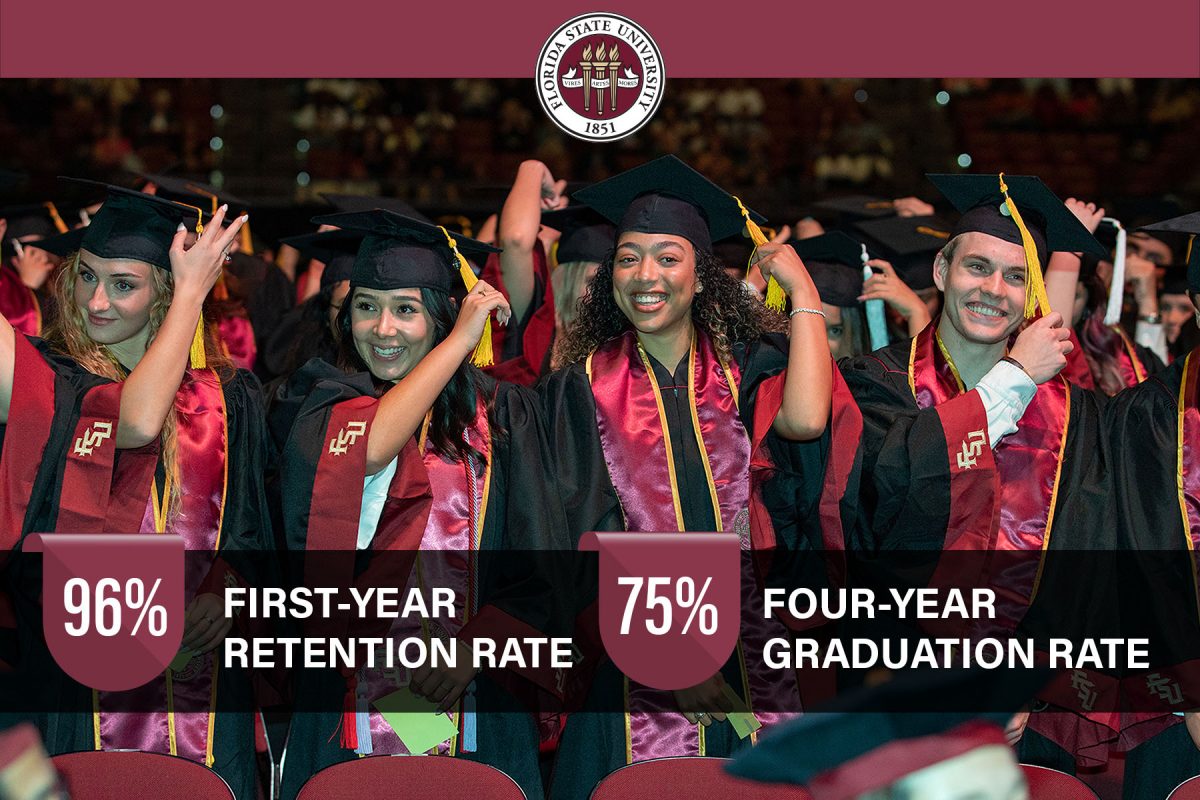
Florida State University achieved record retention and four-year graduation rates this year, boasting two significant accomplishments in student success as it welcomes one of its most academically advanced freshman classes.
The retention rate, which measures how many first-year students stay enrolled from one fall semester to the next fall, reached 96% for the first time in FSU history, and the four-year graduation rate landed at a new high of 75%, according to data that will be part of the State University System’s 2024 Accountability Plan.
“This is exciting news that underscores FSU’s commitment to student success,” said President Richard McCullough. “Faculty, staff and administrators from every corner of campus are focused on seeing our students graduate on time with a degree that will help them pursue a meaningful career and contribute to their communities.”
Using the most recent publicly available data, FSU’s Office of Institutional Research projects these numbers will secure FSU in the Top 10 among public universities in both categories.
“These milestones reflect FSU’s unique focus on nurturing and shaping the whole student,” said Jim Clark, provost and executive vice president for Academic Affairs. “We’ve worked hard to cultivate an enriching environment where every student, regardless of background, can build relationships, find mentors and participate in rewarding experiences in and out of the classroom that empower them to succeed throughout their time here and beyond.”
Investments and improvements in student success at FSU have included enhancing existing resources and adding new ones.
“This is exciting news that underscores FSU’s commitment to student success. Faculty, staff and administrators from every corner of campus are focused on seeing our students graduate on time with a degree that will help them pursue a meaningful career and contribute to their communities.” — President Richard McCullough
To help undergraduate students navigate their academic journeys, FSU boosted its Advising First network, growing its team of academic advisers, guides, college life coaches and staff to nearly 100. Through Advising First, students can access a broad range of support services, from one-on-one meetings to workshops and campus-wide events, that all serve to help students establish and realize their personal, academic and career goals.
Advising First also launched the new Center for Academic Guidance, a team of seven seasoned higher education professionals who provide assistance to students who may be experiencing barriers to success, such as a health emergency, financial strains or other extenuating circumstances. Academic Guides work proactively to connect students with helpful campus resources they may not know exist.
“We want to continue to grow our advising team because the more advice you can get, the better the chance that you will do well,” McCullough said. “It’s important to have someone who you can go to help you through challenging times.”
For the first time last year, all first-year students were required to participate in the Engage 100 program, which runs small, mentor-guided courses designed to group students with likeminded peers and help them find community early in their college experience.
A new Living-Learning Community for first-generation students, FGEN Noles, launched last year as another opportunity to engage students right away by giving them a dedicated residence hall experience with others who were also the first in their families to attend college.
The Graduation Planning and Strategies Office, which runs a nationally recognized completion campaign to help academically inactive seniors come back to school and graduate, celebrated its five-year anniversary this year. More than 2,500 students have worked with the office’s dedicated graduation specialist to earn a diploma.
Those targeted investments complement other recent improvements for undergraduates across the university, such as expanding study abroad and undergraduate research opportunities, enhancing student wellness services, increasing involvement and engagement programming, reducing class sizes and boosting faculty support, and growing the Honors Program and Presidential Scholars Program.
“I feel grateful to be at a university that has such a longstanding and deep commitment to students and their success,” said Associate Provost and Dean of Undergraduate Studies Joe O’Shea. “I am most excited by what’s behind the numbers – the thousands of students and their families who will be forever changed by an FSU education. I’m proud of these students, and I know they will have a tremendous impact on the world.”



